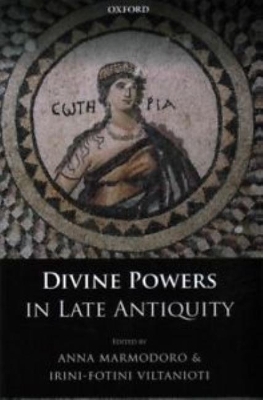
Divine Powers in Late Antiquity
Oxford University Press (Verlag)
978-0-19-876720-6 (ISBN)
Is power the essence of divinity, or are divine powers distinct from divine essence? Are they divine hypostases or are they divine attributes? Are powers such as omnipotence, omniscience, etc. modes of divine activity? How do they manifest? In which way can we apprehend them? Is there a multiplicity of gods whose powers fill the cosmos or is there only one God from whom all power(s) derive(s) and whose power(s) permeate(s) everything? These are questions that become central to philosophical and theological debates in Late Antiquity (roughly corresponding to the period 2nd to the 6th centuries). On the one hand, the Pagan Neoplatonic thinkers of this era postulate a complex hierarchy of gods, whose powers express the unlimited power of the ineffable One. On the other hand, Christians proclaim the existence of only one God, one divine power or one 'Lord of all powers'.
Divided into two main sections, the first part of Divine Powers in Late Antiquity examines aspects of the notion of divine power as developed by the four major figures of Neoplatonism: Plotinus (c. 204-270), Porphyry (c. 234-305), Iamblichus (c.245-325), and Proclus (412-485). It focuses on an aspect of the notion of divine power that has been so far relatively neglected in the literature. Part two investigates the notion of divine power in early Christian authors, from the New Testament to the Alexandrian school (Clement of Alexandria, Origen, Athanasius the Great) and, further, to the Cappadocian Fathers (Basil the Great, Gregory of Nyssa), as well as in some of these authors' sources (the Septuagint, Philo of Alexandria). The traditional view tends to overlook the fact that the Bible, particularly the New Testament, was at least as important as Platonic philosophical texts in the shaping of the early Christian thinking about the Church's doctrines. Whilst challenging the received interpretation by redressing the balance between the Bible and Greek philosophical texts, the essays in the second section of this book nevertheless argue for the philosophical value of early Christian reflections on the notion of divine power. The two groups of thinkers that each of the sections deal with (the Platonic-Pagan and the Christian one) share largely the same intellectual and cultural heritage; they are concerned with the same fundamental questions; and they often engage in more or less public philosophical and theological dialogue, directly influencing one another.
Professor Anna Marmodoro specialises in metaphysics and its history; she has a background in ancient, late antiquity and medieval philosophy, and a strong research interest in the philosophy of religion and the philosophy of mind, and. She is the author of Everything in Everything: Anaxagoras's Metaphysics (OUP, 2017) and Aristotle on Perceiving Objects (OUP, 2014). Dr Irini-Fotini Viltanioti is aWiener-Anspach Junior Research Fellow at Wolfson College, University of Oxford and Associated Researcher at the University of Brussels and CNRS. She specialises in ancient philosophy, with research interests in classics and the history of religions. Viltanioti is the author of L'harmonie des Sirènes du pythagorisme ancien à Platon (De Gruyter, 2015).
PART 1 THE POWERS OF THE GODS: FROM PLOTINUS TO PROCLUS; PART 2 THE POWERS OF GOD: FROM PHILO OF ALEXANDRIA TO THE CAPPADOCIAN FATHERS
| Erscheinungsdatum | 02.02.2017 |
|---|---|
| Verlagsort | Oxford |
| Sprache | englisch |
| Maße | 161 x 240 mm |
| Gewicht | 574 g |
| Themenwelt | Geschichte ► Allgemeine Geschichte ► Vor- und Frühgeschichte |
| Geschichte ► Allgemeine Geschichte ► Altertum / Antike | |
| Geisteswissenschaften ► Geschichte ► Regional- / Ländergeschichte | |
| Geisteswissenschaften ► Philosophie ► Philosophie Altertum / Antike | |
| Geisteswissenschaften ► Religion / Theologie ► Christentum | |
| ISBN-10 | 0-19-876720-X / 019876720X |
| ISBN-13 | 978-0-19-876720-6 / 9780198767206 |
| Zustand | Neuware |
| Haben Sie eine Frage zum Produkt? |
aus dem Bereich


